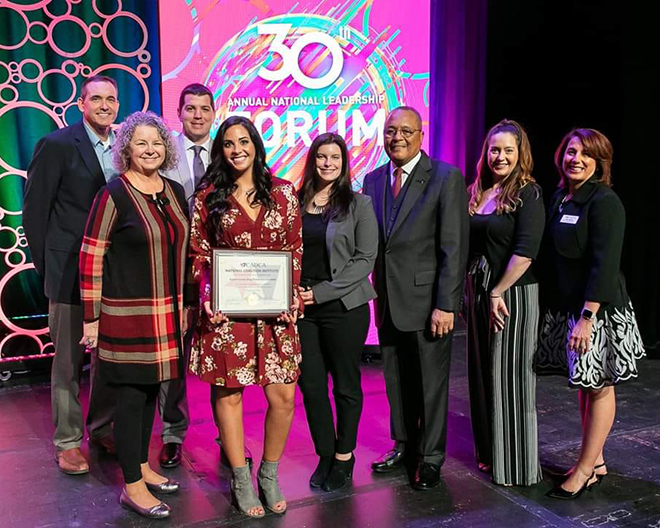County drug prevention coalition receives grant; Funding aimed toward creating ‘drug-free communities’

PHOTO COURTESY OF ALYSSA ROTHMALER Belvidere Republican
The BCDPC visited Congressman Bill Foster in Washington, D.C., to discuss what the coalition is about, and how he and other members of Congress can support the coalition and its prevention efforts in Boone County. In another photo, several members of the BCDPC attended a Community Anti-Drug Coalitions of America (CADCA) National Leadership Forum in 2020. The coalition received a plaque for graduating from the National Coalition Academy, a three-week extensive training on best practices for developing, running and sustaining coalitions through Drug Free Communities funding and partnerships.
Counties across the state are experiencing youth substance use, and Boone County is no exception, according to Alyssa Rothmaler, program director for the Boone County Drug Prevention Coalition, or BCDPC.
The organization was formed when “people in the community came together” with the common goal of combating substance use, she narrated. The coalition is broken up into 12 sectors: youth, parents, businesses, schools, law enforcement, media, civic, fraternal and religious organizations, state and local organizations, substance abuse facilities and organizations, youth-serving organizations and health care.
The Belvidere-based non-profit organization was recently awarded a Drug Free Communities (DFC) Grant, she related in a news release, and it will be spread out over the next five years—to be used as a continuing substance-use prevention resource in the community.
Rothmaler explained that the Drug-Free Communities Support Program has been around since 1997, and it funds community coalitions such as the BDCPC. Grant money “is provided by the Centers for Disease Control,” she stated.
The director outlined that her organization applied for, and received, a $125,000-per-year, five-year grant in 2018, adding that the BDCPC applied for the most recent second-five year grant it was awarded.
Rothmaler emphasized that the grants are “broken up into two sets of five years,” but the organization still had to reapply for the current grant.
She described in the release how the BDCPC is “a proactive coalition that dedicates time to serving youth and families to help provide them with tools to be drug free and knowledgeable about substance misuse and prevention,” adding, “Our mission is to use a community approach to reduce and prevent the use of alcohol, tobacco and other drugs in youth ages 11-18.”
The director said that with the first grant, the organization spent the money on “making our presence known,” helping promote ordinance changes, going into schools and getting involved with the local chamber of commerce.
“We always have a presence in the community,” Rothmaler said, such as at the county fair, with chamber of commerce events, and at back-to-school nights, to name a few.
These are “some of the ways we can easily make contact with parents,” she added.
The coalition also works with area schools, according to the director, and hopes to implement a pilot “restorative” program in the high schools—through the American Lung Association—whereby possession of vaping materials will be handled through a potential four-week educational program instead of an in-school or other suspension—after which the consequences of possession might be reduced.
That way, Rothmaler believes, students might get a chance to have a lesser mark on their school record, yet “It keeps them accountable. It keeps them educated.”
Just as important, students can “learn better coping mechanisms” other than substance use, and also, “maybe change that behavior,” she emphasized.
Along the line of school presence, the BCDPC has also worked with the area schools to look at data from an Illinois Youth Survey, which is conducted every two years for grades eight, 10 and 12.
“This data helps us to gain perspective on current drug and mental health trends in our community,” the director stated in the release, “and drives all the coalition efforts.”
The coalition has used funds to provide drug disposal bins, conduct vape and alcohol compliance checks, and attend training through the CADCA Academy.
Yet another way the BDDPC uses its grant resources is to attend a national leadership forum, meeting with congressional leaders.
That way, Rothmaler said, “We can educate them and help them advocate for better policies.”
With the current grant, unlike the previous five-year grant, this funding will decrease annually from $125,000 after year six (the first year of the new grant), the director mentioned.
So, she continued, the coalition will “have to find more [funding] sources,” such as donations and other grants, to keep the BCDPC sustainable.
The most recent grant process “is very competitive,” the director continued, so “We are thrilled to be funded for an additional five years. These funds will support our efforts and advance the work to increase community collaboration and reduce youth substance abuse in Boone County.”
For more information about the Boone County Drug Prevention Coalition, visit bcdpc.org.



